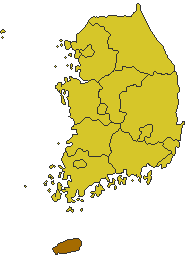Pulau Jeju
Dari Wikipedia bahasa Indonesia, ensiklopedia bebas
| Jeju | |
|---|---|
| Lokasi | |
 |
|
| Nama bahasa Korea | |
| Hangul: | 제주특별자치도 |
| Hanja: | 濟州特別自治道 |
| Alihaksara Baru: | Jeju Teukbyeol Jachi-do |
| McCune-Reischauer: | Cheju T'ŭkpyŏl Chach'ido |
| Data dan statistik(2004) | |
| Luas: | 1 845,55km² |
| Penduduk: | 560 000 jiwa |
| Kepadatan: | jiwa/km² |
| Pemb. administratif: | 2 si |
| ISO 3166-2: | |
| Situs resmi: | http://www.cyber.jeju.go.kr/ |
| Jeju, Pulau Vulkanik dan Tabung Lava | |
|---|---|
 |
|
| Situs Warisan Dunia UNESCO | |
| Negara | |
| Tipe | Alam |
| Kriteria | vii,viii |
| Nomor identifikasi | 1264 |
| Kawasan UNESCO | Asia Pasifik |
| Tahun pengukuhan | 2007 (sesi ke-27) |
Terletak di Selat Korea, sebelah barat daya Provinsi Jeolla Selatan, yang dahulunya merupakan satu provinsi sebelum terbagi pada tahun 1946. Ibukota Jeju adalah Kota Jeju (Jeju-si).
Topografi Pulau Jeju terbentuk sekitar 2 juta tahun lalu oleh aktivitas vulkanis. Di tengah-tengah pulau muncul Hallasan (Gunung Halla), gunung tertinggi di seluruh Korea (1.950 m). Pulau ini bercuaca hangat sepanjang tahun dan pada musim dingin jarang turun salju, sehingga tanaman-tanaman yang tumbuh di daerah subtropis bisa bertahan hidup.
Pulau Jeju dijuluki Samdado, "Pulau yang Berlimpah dengan Tiga Hal" yaitu, bebatuan, wanita dan angin]. Karena memiliki keindahan alam dan kebudayaan yang unik, Pulau Jeju adalah salah satu objek wisata paling terkenal di Korea. Dalam catatan sejarah, Jeju disebut dalam berbagai nama, mulai dari Doi, Dongyeongju, Juho, Tammora, Seomna, Tangna atau Tamra.
Kota pelabuhan terdekat Jeju dengan daratan utama Korea adalah Mokpo, provinsi Jeolla Selatan. Panjang garis pantai 253 km, luas keseluruhan 1.825 km². Suhu di Jeju dapat bervariasi, mulai dari tropis sampai subtriopis. Suhu rata-rata per tahunnya adalah 14,6° C dan 4,7° di musim dingin. Keanekaragaman flora yang tumbuh di Jeju sangat berbeda dengan yang ada di Semenanjung Korea. Karena iklimnya yang baik, pulau ini ditumbuhi lebih dari 1.700 jenis tanaman, sehingga Jeju dijuluki sebagai "Pulau Botani" karena kekayaan floranya.
Selama berabad-abad, penduduk Pulau Jeju dijuluki sebagai yukgoyeok ("enam jenis pekerja keras") yang merujuk kepada warga yang mengerjakan berbagai pekerjaan sulit dan berat untuk hidup, seperti mencari abalon dan kerang dengan cara menyelam ke dasar laut, membangun pelabuhan, beternak, membuat kapal dan bertani. Seringkali mereka diperas demi membayar upeti kepada penguasa di ibukota. Bencana alam seperti kekeringan dan angin topan juga sering mengakibatkan gagal panen dan kelaparan yang memakan banyak korban jiwa.
Peristiwa paling kelam dalam sejarah rakyat Jeju adalah insiden berdarah pada periode pembentukan Republik Korea pada tahun 1948 sampai periode Perang Korea (1950-1953) dimana banyak warganya dibantai karena dianggap sebagai sarang pemberontak atau pengikut komunis. Karena mengalami kehidupan yang keras oleh tekanan penguasa, warga Jeju dikenal sebagai orang-orang yang tabah dan mampu bertahan dalam situasi yang sulit. Rakyat Jeju menyatakan tentang kehidupan mereka dengan ungkapan:
| “ | Kebahagiaan itu kecil seperti butir pasir, sementara kesedihan itu sebesar batu karang | ” |
